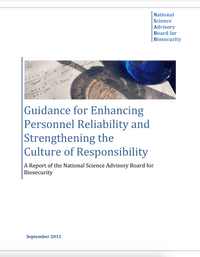Guidance for Enhancing Personnel Reliability and Strengthening the Culture of Responsibility
[Personnel Reliability and Culture of Responsibility]
This resource includes recommended practices from the National Science Advisory Board for Biosecurity (NSABB) of the United States for enhancing personnel reliability and a culture of responsibility with respect to biosecurity. Most critically, the NSABB outlines good management and strong leadership practices that users may find informative for implementing or strengthening a culture of responsibility across a range of settings with biosecurity implications.
SUMMARY
The National Science Advisory Board for Biosecurity (NSABB) of the United States compiled this resource to recommend practices for enhancing personnel reliability and a culture of responsibility with respect to biosecurity, in response to a request from the U.S. government. Above all, NSABB found that good management practices and strong leadership are the foundation for a culture of responsibility and effective biosecurity. Given this, the NSABB outlines tenets of effective management and leadership practices, including clear communication, responsible hiring practices, training, performance review, employee support systems, risk assessments, and codes of conduct. In addition, the NSABB discusses the use of video monitoring and the “two person rule” for enhancing personnel reliability, although does not broadly recommend these practices due to potential unintended consequences. Users may find this guidance informative for implementing responsible practices while considering the effectiveness, potential impact, unintended consequences, costs, and administrative burden of any measures being implemented.
The NSABB is a federal committee that advises the United States government on issues related to biosecurity and dual use research. To craft the recommendations included in this resource, the Board held panel discussions with experts in employment law and human-resources practices, representatives of Institutional Biosafety Committees, an authority on the Select Agent Program’s Security Risk Assessment process, and a representative from the Amerithrax Expert Behavioral Analysis Panel. The Board also held two roundtables to engage people from the scientific research community and a public consultation to garner a broader range of perspectives. This resource is openly available as an English PDF.


..png)
